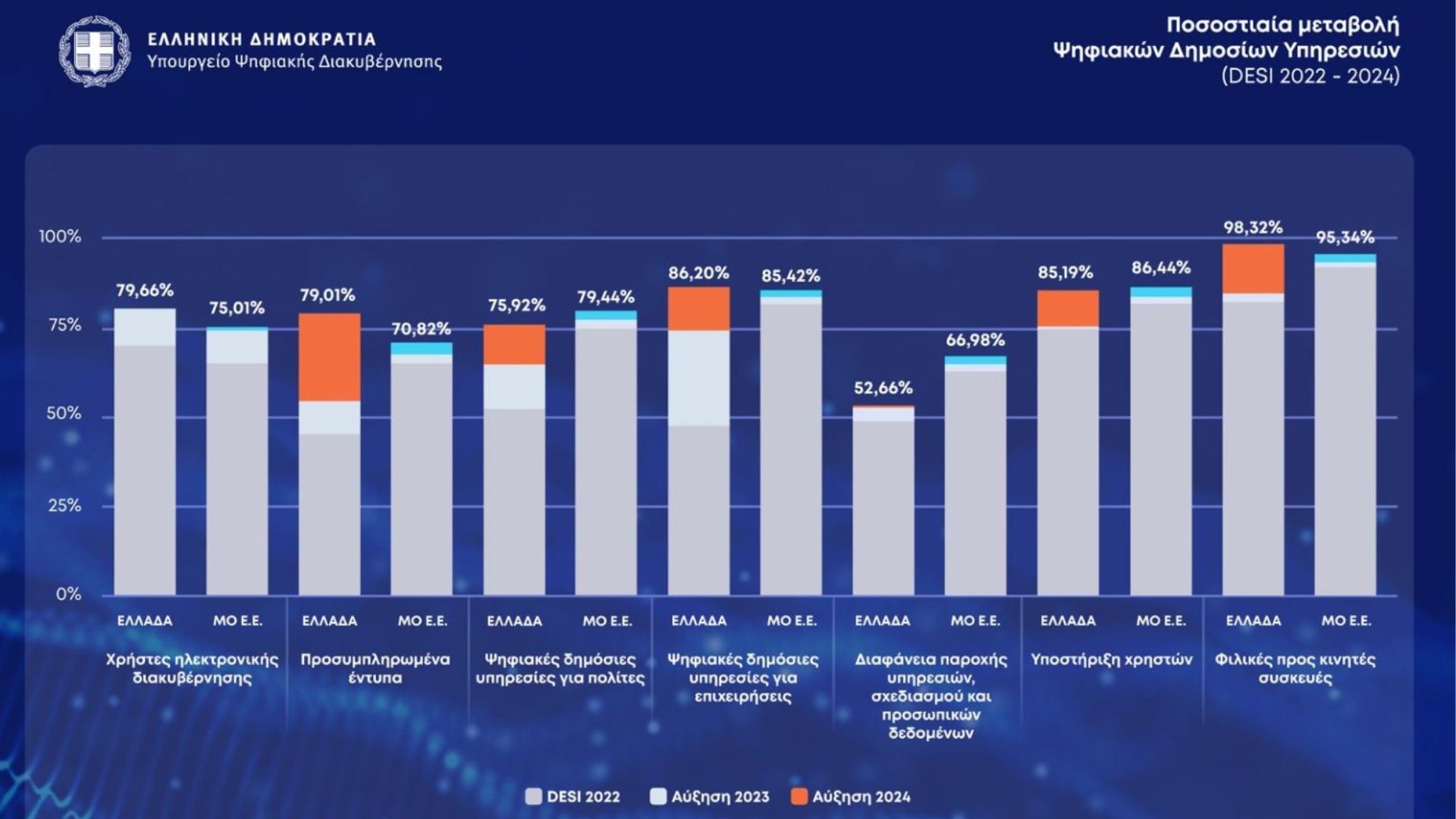Notable progress in the digitalisation of public services was made by Greece in 2023, while at the same time it recorded the largest improvement in this area with a percentage of 16% in the last four years. In total, within two years, Greece has approached and in many cases surpassed the European Average. Greece’s progress is reflected in the European Commission’s annual report on the Digital Decade (DESI).
Greece also saw a rise in the development of fibre-optic connectivity infrastructure at the facilities (FTTP). Although it still falls short of the European average of 63.99% with an increase of 7.63 percentage points, our country recorded an increase of 10.56 percentage points to 38.41%. Greece also recorded progress in 5G coverage, which amounts to 98%, recording an increase of 14.5 percentage points, while the European average stood at 89.3%, recording an increase of 9.8 percentage points.
More specifically in the indicators:
- e-Government users: Our country has managed to reach 79.66% in users of e-government services provided by the state, surpassing the European average steadily since 2023. This proves the acceptance and effectiveness of gov.gr, which has become an integral part of citizens’ everyday life.
- Pre-filled forms: Greece was rated at 79%, exceeding the European average of 70.8%. This is an increase of 24.6 percentage points while the growth rate of the European average was 3.26 points. The high rates of progress achieved by our country in this area demonstrate the improvement of administrative efficiency for the benefit of citizens.
- Digital public services for citizens: Greece is progressing at 75.9%, approaching the European average of 79.4%, recording an increase of 11.3 percentage points. This is a multiple of the 2.41 percentage points that is the average growth rate in Europe, showing the strengthening of digital services for citizens.
- Digital public services for businesses: Greece recorded 86.2%, exceeding the European average of 85.4%. The increase of 12.5 percentage points shows the support of business with modern digital solutions
- User support: Our country is approaching the European average of 86.4%, with a percentage of 85.1% and an increase of 10 percentage points. This is significantly more than the European level of 2.85 percentage points.
- Mobile-friendly devices: With a rate of 98.32%, Greece exceeds the European average of 95.3%, recording an increase of 13.6 percentage points. A progress that reflects the continuous commitment of the Ministry of Digital Governance to the implementation of digital services that are accessible from mobile, effectively facilitating the daily lives of citizens and businesses.
However, significant challenges remain in other areas. The shortage of ICT professionals in the labour market is one example, for which digital upskilling initiatives for workers, such as the National Coalition for Digital Skills and Jobs and the Digital Competence Academy, have been launched by the Ministry of Digital Governance. In particular, the Ministry of Digital Governance has recently issued a new call for the 2021-2027 Digital Transformation Programme, with a total budget of €62.5 million, for the implementation of upskilling programmes in innovative digital technologies based on market needs and current ICT trends.
As regards the use of digital technologies by Small and Medium-sized Enterprises (SMEs) to enhance their competitiveness, but also the use of the possibilities offered by cloud infrastructure, data analytics and artificial intelligence, Digital Innovation Hubs have been established with a total budget of €32 million. The “Digital Transformation of SMEs” Programme, which includes 3 actions with a total budget of 300 million Euros, is also implemented by the Ministry of Digital Governance with funds from the NSRF-EPAN. In addition, under the National Recovery and Resilience Plan Greece 2.0, the programmes “Digital Tools for SMEs”, “Development of Digital Products and Services” and “Digital Transactions” with a total budget of € 372.5 million are implemented with funding from the European Union-NextGenerationEU.

Re-publishing of the relevant Press Release of the Ministry of Digital Governance
Source: European Digital Skills & Jobs Platform


